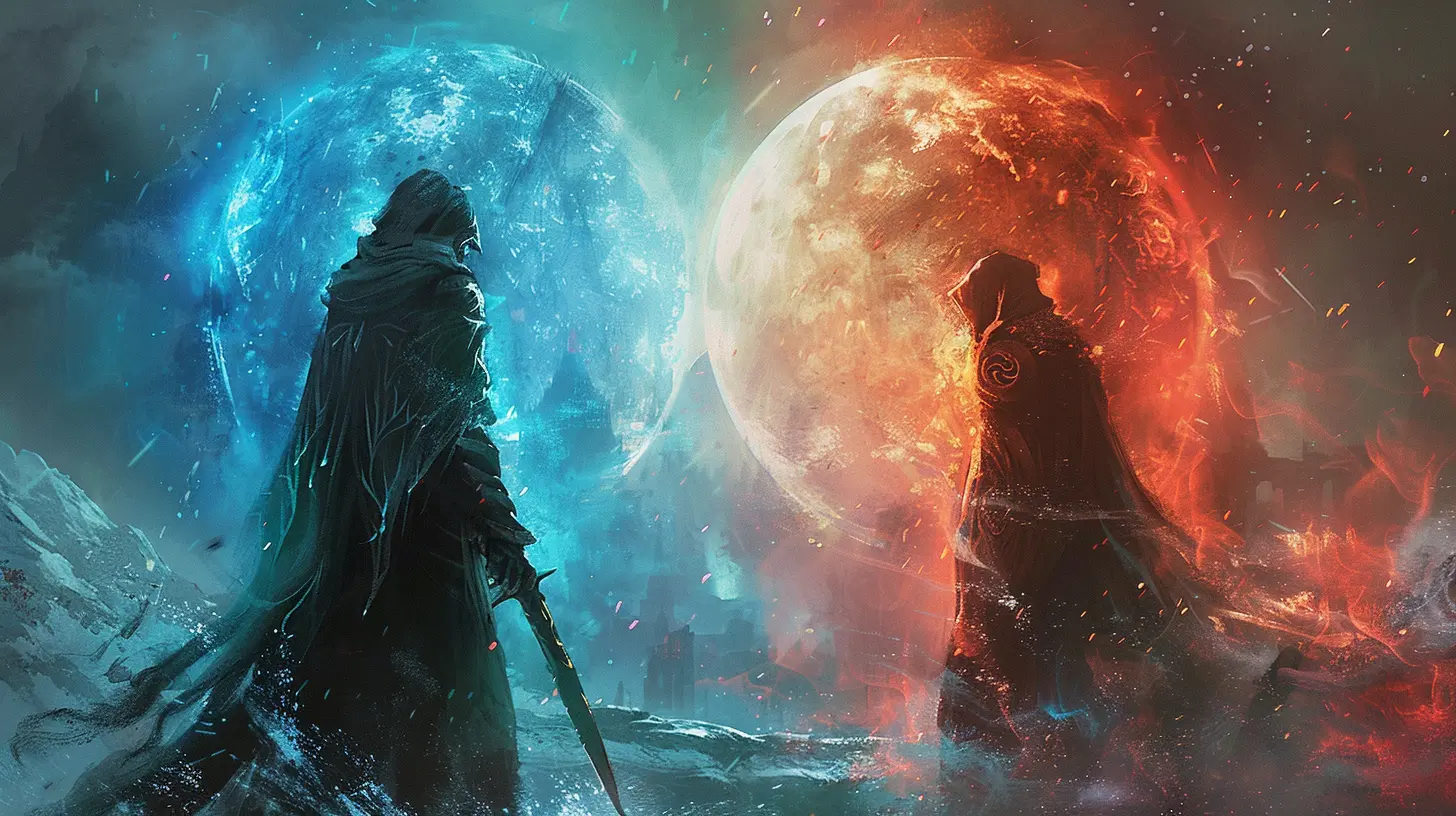The Allure of Third-Person vs. First-Person in Fantasy Games
3 October 2025
Fantasy games have always been an escape hatch from reality. They drop us into sprawling kingdoms, heart-stopping battles, and heartwarming (or heartbreaking) stories. But as gamers, we all have our preferences when it comes to how we experience these magical worlds. Some of us gravitate towards the all-seeing, over-the-shoulder view of third-person games. Others feel more connected to the intimate, see-through-your-eyes perspective of first-person titles.
You might not think about it as you dive headfirst into your favorite RPG, but this choice—third-person vs. first-person—shapes every second of your gaming experience. It's like deciding whether you want to stare at a painting up close or step back to take in the whole masterpiece. Both perspectives have their charm. But what makes them so special in the context of fantasy games, where immersion is everything? Let’s dig in.
Why Perspective Matters in Fantasy Games
Think about the last fantasy game you played. Was it the sweeping vistas of The Elder Scrolls V: Skyrim? Or maybe the gripping narrative of The Witcher 3: Wild Hunt? Regardless of the game, there’s something about fantasy worlds that demands your full attention—and perspective plays a huge role in delivering that.In fantasy games, you’re not just pressing buttons to complete objectives; you’re living a story. Perspective determines how you interact with that story. It colors how you perceive the world around you, how you fight battles, and how you feel about the characters you meet along the way. It’s the difference between looking someone in the eye during a heated argument and watching that argument unfold from the sidelines. Both experiences are valid, but they ignite different parts of your brain.
The Third-Person Perspective: “The Director’s Chair”
Third-person perspective is like being the invisible director of a movie. You’re not in the character—you’re watching them from above or behind. Most fantasy games, from Dark Souls to Dragon Age: Inquisition, lean heavily on this perspective. Why? Because it’s ideal for storytelling, world-building, and combat.1. Connecting with Your Character
In third-person games, you’re not just a set of eyes or a floating camera. You’re a tangible character, someone with a physical presence in the world. You can see your elaborate armor, admire your fire-infused sword, and laugh at how ridiculous your character looks while sprinting down a cobblestone street.It’s easier to form a bond with your player avatar when you can see them. Think about Geralt of Rivia—his brooding stance, iconic white hair, or even his cocky smirk when he’s about to deal a killing blow. You wouldn’t get the same connection if you were staring out of his eyeballs.
2. Sweeping Vistas and World-Building
Fantasy games aren’t just about what’s right in front of you. They’re about the world. Third-person games let you soak in the environment in all its glory. You can watch as a massive dragon circles above a crumbling castle or see the sun setting over rolling green hills. It's almost cinematic—you feel like a tiny part of something much bigger.Imagine playing The Legend of Zelda: Breath of the Wild in first-person. Sure, you’d get a closer look at the intricate details, but you’d lose that grand sense of scale. Third-person lets you take everything in without feeling boxed in.
3. Combat Feels Like a Choreographed Dance
Third-person combat is all about spatial awareness. You can see enemies sneaking up from behind or gauge the distance between you and that fire-breathing wyvern. Combat feels more like a dance—you’re weaving, dodging, and striking with precise movements.Take Horizon Zero Dawn, for example. Aloy’s smooth animations as she leaps, rolls, and lets arrows fly make the gameplay look like a piece of choreographed art. It’s these small visual details that third-person excels at.
But hey, no perspective is perfect, right? Third-person may feel a bit disconnected at times. You’re watching the action, not living it. And that’s where first-person swoops in.
The First-Person Perspective: “Through the Looking Glass”
First-person fantasy games are a completely different beast. They don’t just invite you into the world—they throw you headfirst into it. You’re not a viewer; you’re in the story. It’s as if the screen disappears entirely, leaving nothing between you and the fantasy.1. Total Immersion
This is where first-person shines. Everything you see, hear, and feel in the game is happening to you. You’re the one who feels the weight of sprinting up a mountainside or the terror of peeking around a corner in a dark dungeon. It’s raw, intimate, and incredibly immersive.Think about Skyrim. When a dragon lands with enough force to shake the ground, you can almost feel the weight of it in your chest. When you’re exploring a foggy forest, the world feels eerily quiet—just you and the sound of your breathing. It’s the kind of immersion that can make your palms sweat.
2. Heightened Tension and Risk
In first-person games, nothing feels safe. You can’t “cheat” by spinning the camera around to see what’s behind you. You’re blind to the world outside of your line of sight, and that vulnerability adds a layer of tension that’s hard to replicate in third-person.Imagine crawling through a crypt in Amnesia: The Dark Descent. Every creak of a floorboard, every faint whisper in the darkness feels like a threat. It’s this tension that makes first-person games perfect for moments of high stakes and heart-pounding action.
3. Combat Becomes Personal
In first-person fantasy games, combat feels less like a performance and more like survival. You’re aiming with your bow, swinging your sword, and dodging attacks all in real time. There’s no buffer between you and the action. The stakes feel personal.Take Dishonored, for instance. Tackling enemies head-on or sneaking past them feels tactile. Every swing or stab lands with a satisfying crunch, making you feel fully in control—or fully responsible for your failures.
The Limitations of Each Perspective
Of course, each perspective has its flaws. Third-person games can feel detached at times, like you’re watching the action unfold rather than participating. There’s also the issue of cluttered HUDs or awkward camera angles that sometimes break immersion.First-person games, on the other hand, can feel limiting. You can’t see your character’s epic armor, and you might feel claustrophobic in tight spaces. Plus, motion sickness can be a real problem for some players (looking at you, VR!).
At the end of the day, it’s not about one being better than the other, but about how a game uses perspective to enhance its story and gameplay.
Hybrid Perspectives: The Best of Both Worlds?
Some games try to bridge the gap between first- and third-person perspectives. Titles like Skyrim or Fallout 4 let you switch between the two viewpoints, giving players the freedom to choose how they want to experience the world.While this flexibility is great, it also raises an interesting question: Do hybrid perspectives risk losing the strengths of both? When you try to cater to everyone, do you water down the impact of either approach? Something to chew on, for sure.
So, Which Perspective Wins?
If you’re waiting for me to crown either third-person or first-person as the ultimate perspective, sorry to disappoint. The truth is, it’s all about personal preference. Some gamers thrive on the cinematic beauty of third-person views, while others crave the intimacy of first-person immersion. At the end of the day, the best perspective is the one that pulls you deeper into the world and the story.Fantasy games are all about magic, wonder, and escapism, and both perspectives excel at delivering those feelings in their own ways. Whether you’re steering a character from over their shoulder or peering through their eyes, the allure of fantasy games remains the same: They let us be the hero of a world that feels endless and alive.
all images in this post were generated using AI tools
Category:
Fantasy GamesAuthor:

Lucy Ross
Discussion
rate this article
1 comments
Caitlin Dillon
Why choose between first and third when you can embrace both? Let’s ride unicorns and peek behind the dragon's tail!
October 8, 2025 at 4:39 PM

Lucy Ross
Embracing both perspectives enriches storytelling, allowing players to connect deeply while exploring vast worlds. Let the adventure unfold in every dimension!


